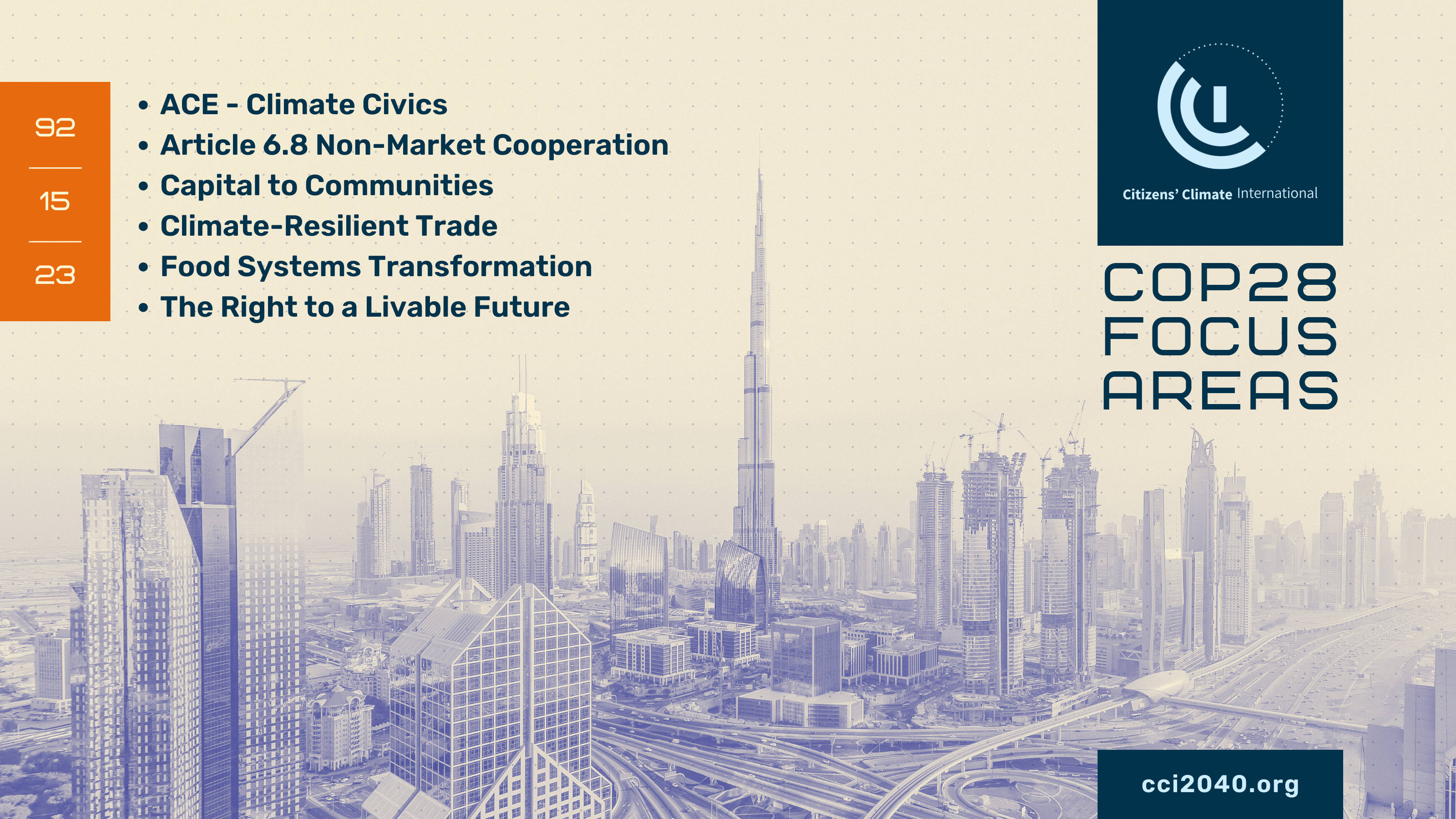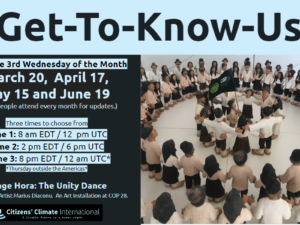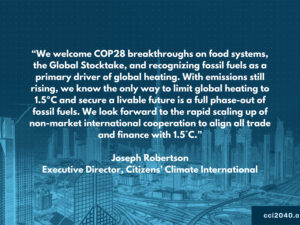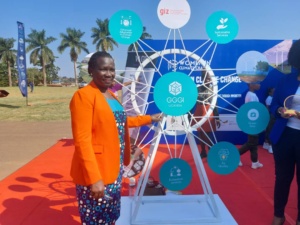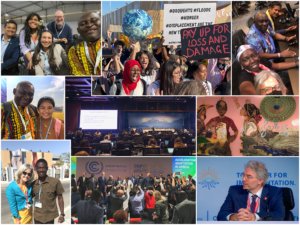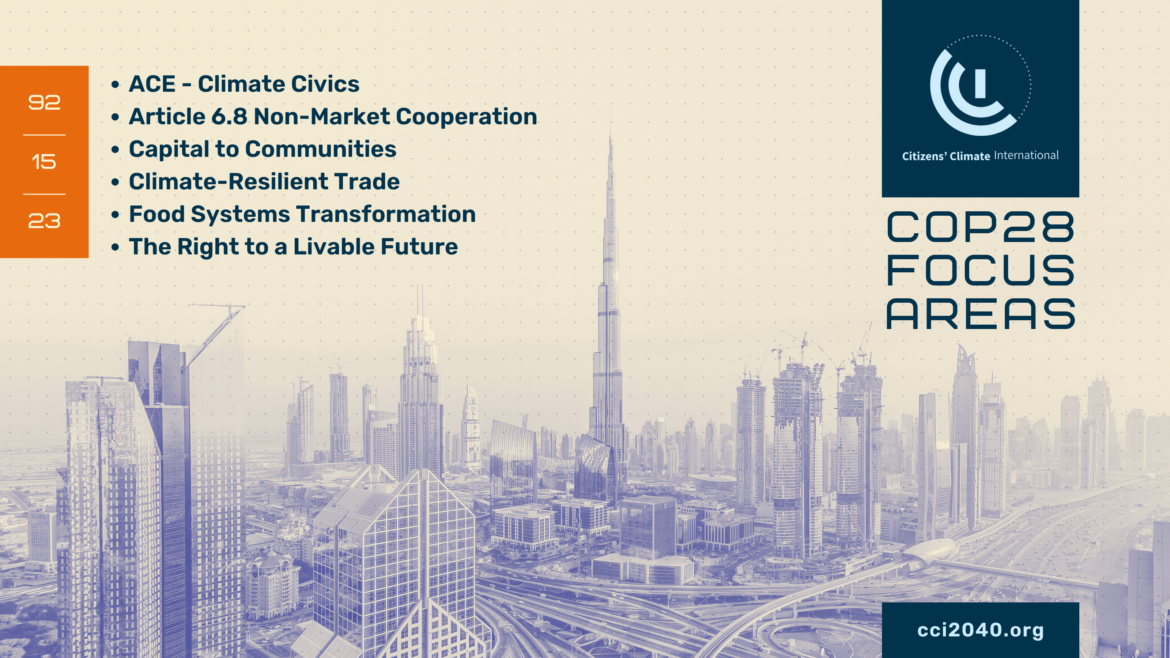
National climate plans must be upgraded to be economy-wide, include all global heating pollution, and accelerate timelines to zero emissions, to align with the Right to a Livable Future. To support this, we are focusing on Action for Climate Empowerment (climate civics), Capital to Communities, and climate-resilient trade, food systems transformation, and non-market multilateral cooperation to pull them all together. Below, we provide some context and detail for each, our sense of the ethics of this design era, and links to important background resources.
The Right to a Livable Future
At Citizens’ Climate International, we recognize global heating and climate disruption pose a complicated and worsening existential threat—putting lives, livelihoods, and the stability of food supplies, communities, and nation states at risk. This is why we believe all climate conversations should include some recognition of the human right to a livable future.
Weekly COVID-19 check-ins with our network of stakeholder leaders, in 2020, revealed that people in diverse local and country contexts were facing economic disruption, health and security vulnerabilities, and a worrying erosion of everyday livability and resilience. The Principles for Reinventing Prosperity emerged from those discussions.
One of those principles is that “Resilience is a baseline imperative.” Policy, planning, and incentives should not treat resilience as an unreachable ideal, but as a legitimizing duty. Our 2023 Reinventing Prosperity Report takes stock of the lingering “polycrisis” and emphasizes the right to resilience, which is another way of saying the right to a livable future.
The right to resilience includes the right to:
- experience the benefits of decision-making based on the best available science;
- enjoy a clean and healthy environment;
- receive early warning of climate-related risks and disasters;
- access climate-resilient, sustainable food systems that produce healthy, nutritious food, affordably;
- be protected from physical threats—from geophysical shock events and their aftermath and from conditions of violence and destabilization that can follow climate shocks or prolonged disruption and destabilization;
- participate in decision-making at the local, national, and international levels, to ensure climate policy and related financial flows are rooted in local experience and designed to succeed;
- see climate-related loss and damage addressed in a coordinated, responsible, and timely way—never leaving vulnerable people to carry the burden alone.
To work seriously and expeditiously toward a livable future, we need to recognize the degree to which livability is severely under threat. So, we are keeping top of mind two evidentiary findings that should shape all international cooperation going forward. First, the 2023 State of the Climate report warns that:
“By the end of this century, an estimated 3 to 6 billion individuals — approximately one-third to one-half of the global population — might find themselves confined beyond the livable region, encountering severe heat, limited food availability, and elevated mortality rates because of the effects of climate change (Lenton et al. 2023).”
Within the lifetime of children alive today, there may be a population equal to three quarters of all people now on Earth facing conditions that are unlivable. In such a world, all of our assumptions about health, security, life expectancy, economic development, and the durability of institutions, will be long forgotten.
Already, tens of millions of human beings are displaced by both slow-moving and sudden climate shocks, suffering terrible conditions of vulnerability and insecurity. We know that worsening climate breakdown means the numbers will continue to raise, and yet we find ourselves in a world in which protections of refugees’ rights are seldom extended to people forced to leave their homes due to climate change.
Within the right to resilience, then, is a very specific challenge needing a solution:
The community of nations must come together around an agreement to honor the full legal personhood and transcendent human rights of people involuntarily displaced by climate change.
Parties should also hold in mind the finding from a 2022 report by Deloitte that assessed traceable costs of unchecked climate change at $178 trillion by the year 2070. This is why major financial regulators are finding that climate change is a threat to the financial system, its ability to support the wider economy, and to the financial stability of nations, including the wealthiest. The good news is that acting rapidly to decarbonize energy systems can avoid those costs and generate an additional $43 trillion in economic opportunity over the same timeframe.
The call issued by the United States and China—in their recent Sunnylands Statement on climate cooperation—for economy-wide 2035 NDCs that cover all global heating pollution, is a welcome signal. At CCI, we will focus at COP28 on six broad areas of work that can break down barriers and activate cooperative future-building on the scale and at the speed required.
Our Focus Areas
The Right to a Livable Future (described above as the right to resilience) should serve as a new global framing to raise ambition and accelerate mobilization. All people have a transcendent right to expect, demand, and uphold the principle that resilience is a baseline imperative. This translates into a need for:
- Active protection of other climate rights;
- A strong, clear, and actionable zero-harm outcome on the Global Goal on Adaptation;
- An invitation to active civic participation in climate-related decision-making (more on this below);
- Accelerated mobilization to decarbonize industrial systems and reduce future climate risk, harm, and cost;
- Expanded finance for adaptation and resilience measures, across whole economies;
- Urgent mobilization of funds for overcoming loss and damage, including direct support to communities in need;
- Sharing of science, technology, and sustained support for robust, actionable early warning systems;
- An integrated and holistic approach to climate-resilient development, across the SDGs.
Action for Climate Empowerment (ACE) is essential, to support every stakeholder, community, country, and region, having the best chance of succeeding against this unprecedented—and worsening—global challenge. For us, this is often about the participation of stakeholders in decision-making. But all six elements of ACE—education, public awareness, training, public participation, public access to information, and international cooperation—are integral to ensuring we have vibrant, informed civic spaces primed for the hard work of making climate-resilient development and prosperity possible. ACE countries, those that lead in active, participatory climate mobilization, will be the leaders that shape the climate-smart future.
Capital to Communities is shorthand for a strategy we outlined in the 2022 Reinventing Prosperity Report, to allow stakeholders and communities to participate in the design, deployment, and monitoring of climate-related financial flows and economic development strategies. The Capital to Communities approach matters, because we don’t have time for costly large-scale errors based on mistaken assumptions about conditions on the ground; we also need to know that deployment of resources is being tracked—not only by interested parties and experts, but by people who live with the consequences of fast-moving climate investments.
Food systems are the major global industry most intimately connected to everyday human health and wellbeing. Our current model is not working: we are seeing record numbers of people facing food insecurity, even as climate stresses make it harder for key regions to reliably produce enough food, and natural systems vital for food production are deteriorating and at risk of collapse.
- There is no path to climate resilient security and prosperity without a rapid transition to food systems that are climate-smart, sustainable, and able to produce affordable nutritious food for all.
- At COP28, CCI is supporting a major side event featuring the launch of a new financial mechanism for food systems transformation.
- We are also linking our Volunteer Empowerment program to the food systems work, through a Food, Finance, and Democracy project—aimed at providing stakeholders with input into policies that shape agriculture, local economies, delivery of climate finance, and community-level experience of food systems.
- We recognize and support the Non-State Actors Call to Action for Transforming Food Systems for People, Nature, and Climate, and recommend commercial, financial, and nonprofit entities sign on to support it, and join the work of reshaping food systems.
Climate-resilient trade is a critical lever for mainstreaming of climate action across the everyday economy. A coordinated effort to phase out new fossil fuel development and to reach net zero as soon as possible will require climate-aligned trade agreements; the COP28 should emphasize the need for aggressive decarbonization and support coordinated cooperative action to decarbonize trade and finance flows, while ensuring the benefits of trade to all involved. And: aligning trade relations with a climate-resilient future is a necessary part of the process of alining all financial flows with Paris Agreement goals, as called for in Article 2. For further detail, read our blue note on how trade can deliver a climate smart future.
Non-market multilateral cooperation under Article 6.8 of the Paris Agreement is a way to activate real-world change in line with all of the above. “Non-market” effectively means any form of international cooperation that is not emissions trading.
- Non-market approaches could include financial regulations, financial delivery, technology and data sharing, border adjustments, agricultural cooperation, and trade.
- Nations can leverage climate income policies and other non-market modes of pollution pricing to shift incentives at the national and multilateral levels.
- Non-market approaches can provide a mechanism for the voluntary race-to-the-top so long talked about and now so urgently needed, while mainstreaming economic development strategies oriented toward reducing vulnerability and creating conditions for climate-resilient security and prosperity. (Note the 2014 PARIS Principles that served as input to the development of Article 6.8.)
- We outline some examples here.
Conflict and humanitarian crisis demand better than zero-sum negotiations
Conditions of conflict and humanitarian crisis are convulsing much of the world. Millions of people across multiple regions have been displaced by conflict, with tens of thousands of civilian lives lost and thousands more illegally abducted by invading regimes. The ongoing campaign of war crimes in Ukraine—including the weaponization of food supplies by Russia to terrorize the world into appeasement—risks setting a dangerous precedent whereby violent, criminal aggression and coercive terror are normalized and legitimized.
The atrocities committed against innocent Israeli civilians on October 7 clearly constitute crimes against humanity, and all responsible must be brought to justice. All nations have a duty to support this fundamental enforcement of international law. At the same time, the humanitarian crisis unfolding in Gaza must urgently be addressed. All human beings, by virtue of their existence, have basic irreducible human rights—including the right of non-combatants to remain free from combat and from forced deprivation. Food, water, sanitation, medicine, and the energy supplies to sustain these basic support services for civilian life must never be weaponized or targeted.
Around the world, conditions of conflict and humanitarian crisis are exacerbated by worsening geophysical threats, as outlined above. As we outlined above, involuntary displacement due to climate change will only continue to set new records, unless we halt global heating emissions and reverse climate change.
We are living through a crucial moment in the history of our species, when long-running future conditions will be decided by critical design choices we make now. Everyone participating in the COP28 has a fundamental duty to help ensure the process is rescued from zero-sum misrepresentations that sabotage progress. That cooperative rescue effort will mean sharing insights, reframing positions around underlying interest and mutual gains, structurally evolving international finance, working consciously across conventions, and deciding to start from and to act on the recognition that all people have a right to climate resilience.
We wish to note, in conclusion, that commitments—even the most ambitious ones—are not enough. Whatever is decided by the COP28, the operational tools, systems, standards, and incentives, that allow for accelerated activation of climate-resilient development strategies will determine our chances of success, at local, national, and global levels. So, we call on all Parties to not only upgrade national climate action commitments, but to establish, deploy, and mainstream the tools, systems, standards, and incentives needed to get the job done, and to make climate co-benefits available to everyone regardless of income-level or geography.
As climate breakdown is unfolding in real time, only the highest ambition makes sense now.
About our COP28 ‘design era’ graphic
Our COP28 focus areas graphic is full of meaning. Read about it here.
The People’s Pavilion
If you are not able to attend the COP28 as an accredited delegate, you can engage with the process through the People’s Pavilion digital platform, supported by the VoLo Foundation and a network of allies.
- The platform: PeoplesPavilion.net
- Grand Opening event: bit.ly/peoplespavilion
- Follow CCI COP28 activities in the platform or at cci2040.org
Background Reading
And we need to recognize that acting on the best available science means using evidence as a tool for decision-making, even when we might rather turn away from inconvenient facts about our industrial systems. To do that, we recommend all participants in the COP28 reference and translate into action key insights from the following science reports, previous decisions, briefing notes, and other resources.
Science Reports & Climate Action Analysis
- 6th Assessment Report of the Intergovernmental Panel on Climate Change (IPCC AR6)
- The State of the Climate Report
- 2023 State of the Cryosphere Report
- The 2023 Planetary Boundaries Assessment
- Songwe-Stern Commission Report on Scaling Up Climate Finance
- The 2023 Production Gap Report
- 5th National Climate Assessment from the US Global Change Research Program
About the Process
- The COP28 Formal Agendas (including treaty texts, legal decisions, notes on other conventions, and a glossary of acronyms and abbreviations)
- The First Global Stocktake under the Paris Agreement
- Earth Diplomacy Leadership – workshops and interim reports for the COP28 cycle
- Blue Notes – CCI briefing notes, formal submissions, and major reports
- Earth Negotiations Bulletin – flagship daily reporting on the negotiations, from IISD
- Guide to the COP28 – from The Nature Conservancy
Other Conventions and Multilateral Meetings
- The Climate Vulnerable Forum – international partnership of countries highly vulnerable to a warming planet, supporting the V20 ministerial meetings
- G20 Process of intergovernmental and stakeholder meetings (virtual Leaders Summit on 22 Nov 2023)
- The Global Shield against Climate Risks (G7-V20 collaboration)
- Kunming-Montreal Global Biodiversity Framework (Dec 2022)
- Ocean Treaty on Sustainable Use and Conservation of Marine Biodiversity in Areas Beyond National Jurisdiction (BBNJ Agreement)
Statements, Initiatives, and Coalitions
- Carbon Pricing Leadership Coalition
- Cryosphere Call to Action – signed by hundreds of cryospheric scientists, calling for urgent action to limit global heating to 1.5ºC to save ice sheets and prevent catastrophic sea level rise
- Good Food Finance Facility – global co-investment platform for food systems transformation
- Integrated Data Systems Initiative – 5-year innovation sprint linked to AIM for Climate and the Good Food Finance Facility
- Non-State Actors Call to Action for Transforming Food Systems for People, Nature, and Climate
- Resilience Intel – emphasizing Resilience Value to drive the shift to 100% climate-smart finance
- Sunnylands Statement by US and China on enhancing cooperative climate crisis response (Nov 2023)
- UK Global Food Security Summit (Nov 2023) – Announcing new UK-CGIAR Science Center to drive research into climate-resilient crops


